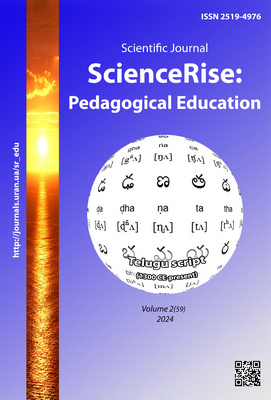Justification of the need to develop professional competence in future officers
DOI:
https://doi.org/10.15587/2519-4984.2024.304579Keywords:
professional competence, future officers, observation method, survey, formation of professional competenceAbstract
The article examines the concept of professional competence and establishes that this concept does not have an unambiguous definition. In this regard, we decided to consider it as a basic characteristic of a personality. Professional competence consists of a set of knowledge, skills and abilities that allow one to perform professional duties effectively and efficiently. It has been established that the professional competence of future officers implies the availability of a wide range of knowledge, skills and abilities necessary for the effective performance of military tasks and responsible decision-making in any conditions. It includes not only an understanding of military strategy and tactics, but also the ability to lead, manage personnel, make strategic decisions and resolve critical situations. The results of the analysis of the educational process of future officers of higher military educational institutions have shown that there are discrepancies between their training and the real experience they gain in full-scale military conflicts, in particular, in the field of engineering support of the National Guard of Ukraine. These discrepancies can have a significant impact on the life and health of military personnel. An empirical study was conducted to confirm the hypothesis that there are such discrepancies between the training of future officers and their actual experience in the field of engineering support of the National Guard of Ukraine. For this purpose, the methods of observation and survey were used. Based on the results of the empirical study, we can note that the training of officers needs to be adapted to modern realities and challenges. In order to achieve a high level of professional competence of future officers, it is necessary to introduce innovative technologies and teaching methods into the educational process. The issue of professional competence development is extremely relevant, especially in the context of future officers, since the security of our borders and the sovereignty of the state depend on their professional skills
References
- Slovnyk inshomovnykh sliv (2000). Kyiv: Naukova dumka, 680.
- Zikiy, H. S. (2017). Formings of professional competence of teacher of the vocational training. Naukovyi chasopys NPU imeni M. P. Drahomanova. Seriia 13: Problemy trudovoi ta profesiinoi pidhotovky, 9, 27–32. Available at: http://enpuir.npu.edu.ua/bitstream/handle/123456789/19623/Zikiy.pdf?sequence=1&isAllowed=y Last accessed: 25.03.2024
- Holovan, M. S. (2008). Kompetentsiia i kompetentnist: dosvid teorii, teoriia dosvidu. Vyshcha osvita Ukrainy, 3, 23–30.
- Chupakhin, S. A. (2014). Problemy formuvannia profesiinoi kompetentnosti maibutnikh inzheneriv-zviazkivtsiv. Molod i rynok, 9 (116), 83–88.
- Bohdaniuk, O. D. (2013). Profesiina kompetentnist maibutnikh ofitseriv prykordonnykiv – osnova yakisnoi pidhotovky do sluzhbovoi diialnosti. Naukovyi visnyk UzhNU Pedahohika. Sotsialna robota, 29, 27–29. Available at: http://surl.li/hyfqg Last accessed: 25.03.2024
- Yesipova, O., Semenov, M., Nikonenko, A. (2024). Aktualnist formuvannia profesiinoi kompetentnosti u maibutnikh ofitseriv. Natsionalna bezpeka Ukrainy v umovakh voiennoho stanu. Odesa, 553–555.
- Volkova, N. P. (2009). Pedahohika. Kyiv: «Akademvydav», 616.
- Walters, M. (1992). A Guide to Supervisory Training, London, Hotel and Catering Industry Training Board. Available at: http://www.re-skill.org.uk/relskill/profcomp.htm Last accessed: 22.04.2024
- Moore, D. R., Cheng, M., Dainty, A. R. J. (2002). Competence, competency and competencies: performance assessment in organisations. Work Study, 51 (6), 314–319. https://doi.org/10.1108/00438020210441876
- Holmes, L. (1992). Understanding Professional Competence: Beyond the Limits of Functional Analysis. Available at: http://www.re-skill.org.uk/relskill/profcomp.htm Last accessed: 22.04.2024
Downloads
Published
How to Cite
Issue
Section
License
Copyright (c) 2024 Olha Yesipova, Evgenij Goncharov

This work is licensed under a Creative Commons Attribution 4.0 International License.
Our journal abides by the Creative Commons CC BY copyright rights and permissions for open access journals.
Authors, who are published in this journal, agree to the following conditions:
1. The authors reserve the right to authorship of the work and pass the first publication right of this work to the journal under the terms of a Creative Commons CC BY, which allows others to freely distribute the published research with the obligatory reference to the authors of the original work and the first publication of the work in this journal.
2. The authors have the right to conclude separate supplement agreements that relate to non-exclusive work distribution in the form in which it has been published by the journal (for example, to upload the work to the online storage of the journal or publish it as part of a monograph), provided that the reference to the first publication of the work in this journal is included.







